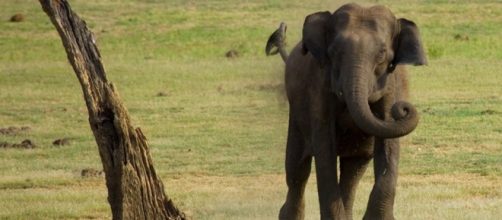A recent elephant encounter video uploaded to Newsflare was recorded in the Kruger National Park in South Africa. A herd of very aggressive elephants gave a number of tourists some very bad moments. Luckily the encounter ended when the animals moved away into the bush. Most encounters with the big beasts inside national parks are peaceful and uplifting, but there are an increasing number of news items that indicate elephants might just be getting fed up with humans. This is hardly surprising, given that they are intelligent animals and they are under pressure from poachers across their global habitat.
Incident in the Zambezi Valley.
There is a true scary story about elephants that was related to the writer, that involved children and a herd of elephants that went berserk. The elephants were close to a main road within a wildlife corridor near the town of Kariba in Zimbabwe. Three local families were out for a day in the bush when they spotted the herd of elephants down in a clearing. Instead of quietly going about their business, the elephant herd charged the vehicles. The chase went of for over three kilometers. Dirt roads and rough conditions made the going slower than the elephants could run. Once again, no one was hurt as the elephants finally gave up the chase. Later it was revealed the elephants had encountered a group of people who had been shooting at them.
Elephants in Asia.
According to Ellie Aid, elephant poaching in Asia is not as wide-spread as in Africa because only “some males” carry tusks, as opposed to African elephants who can have tusks in both sexes. Nevertheless, there is elephant poaching in India because ivory carvers prefer the Asian tusks. They believe it is of superior quality.
Rama Sukumar studied poaching of elephants in India and he reported that poaching accounts for the deaths of up to 68% of male elephants in just three provinces. He further notes that “Cambodia, Vietnam and Laos” elephants are showing an alarming decrease and this might be attributed to poaching pressure as there is a high demand for elephant hide and ivory.
Asian elephants in captivity.
According to Ellie Aid, capturing wild Asian elephants for work or entertainment purposes is a problem despite controls and bans on the practice. In Burma elephants are still removed from the wild for use in logging operations, and many are captured and sent to be used as tourist attractions. This poaching without killing, is nevertheless still poachingand is decreasing the number of wild elephants.
Aggression and human/elephant conflict.
Videos abound on YouTube of rampaging and aggressive elephants. Most of them are from Asia, but they are not confined to that continent. African elephants are just as irritated by humans too. In a video posted by Junkin Videos to YouTube, African elephants demonstrated their anger to a group of tourist on a game drive with Professional safari guide Johann Lombard.
A simple search on the YouTube site reveals many scary encounters. Elephants are intelligent and sentient beings and it is tragic that they are being poached and harassed to the point where they are now justifiably suspicious of humans. There have been reports of elephants killing hunters in Zimbabwe, which some activists feel is the fault of the hunter, but there are also many instances of innocent people being subjected to death or life-threatening danger. Poachers are not just taking the lives of elephants, they are causing immeasurable loss to humans. Elephant encounters that are not aggressive are simply good for the human soul.

